10 Best Brussel Sprouts Companion Plants
Brussel sprouts are one of those plants that are sadly targeted by many garden pests. From aphids to caterpillars, without the necessary protection, your brussel sprouts will become a prime target and feeding ground.
The good news however is that there are things you can do to protect your brussel sprouts from pest infestations. One solution is to utilize companion planting.
Companion planting is where you maximise the space you have in your garden by planting different crops together that complement one another.
Companion plants may:
- Add more nutrients to the soil that plants nearby can benefit from
- Deter pests from eating crops
- offer shade from the sun and protect the roots.
But not all plants complement one another. Some plants will directly compete for space and nutrients. So it is important to ensure you know which plants work well together, and which to avoid.
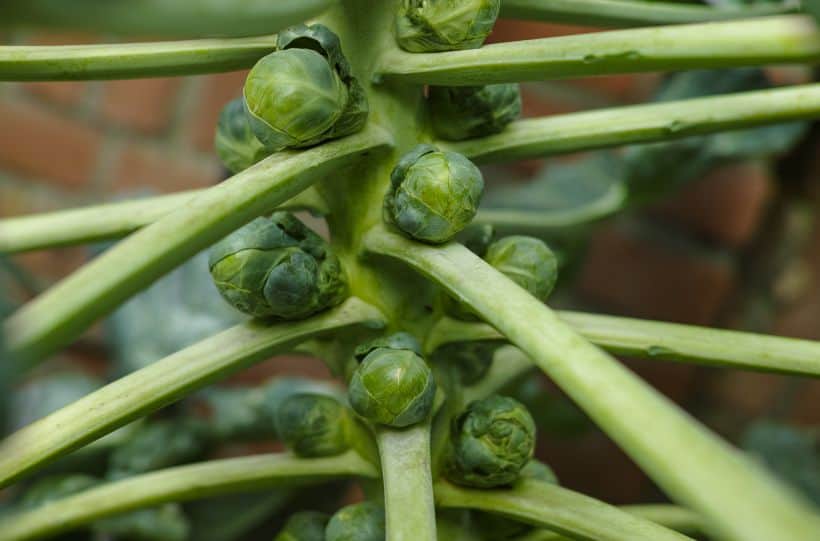
Here we take you through some of the best brussel sprouts companion plants, along with which plants you should avoid.
10 Brussel Sprouts Companion Plants
Beets
Beets are companion plant that helps add nutrients to the soil. Specifically, they add magnesium which benefits the growth of your brussel sprouts.
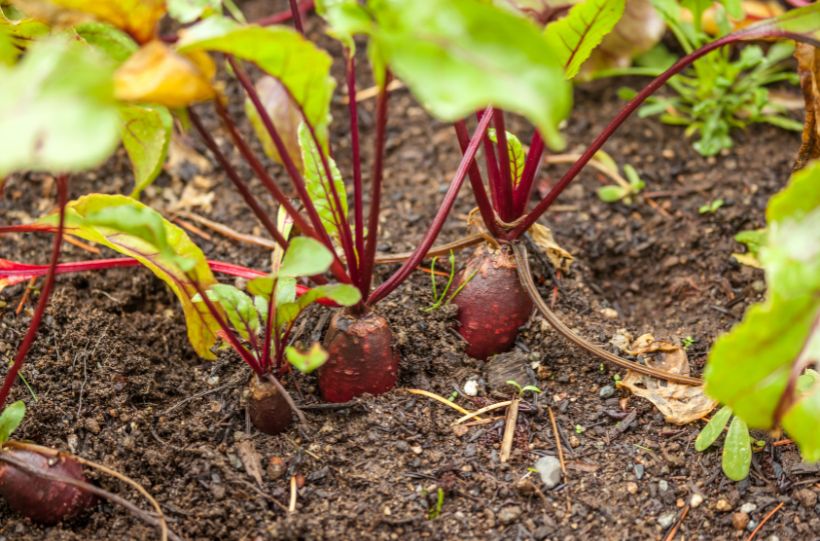
They also can tolerate some shade caused by the growing brussel sprouts. But ensure they aren’t planted too close together as too much shade will prevent your beets from growing as much.
Carrots
If you want better-tasting brussel sprouts then consider planting carrots near them. Carrots can help improve the taste of brussel sprouts by making them sweeter. They also help to loosen the soil around your brussel sprouts improving drainage and adding nitrogen for your brussel sprouts to use.
Celery
Celery can also help improve the taste of your brussel sprouts, but it is mostly used as a brussel sprout companion plant to repel pests. Celery helps to deter cabbage worms which feed on brussel sprouts.
Alliums
Alliums such as onion, garlic, chives, and leeks make excellent companion plants with brussel sprouts. Their strong scent deters several pests such as cabbage butterflies, aphids, and whiteflies.
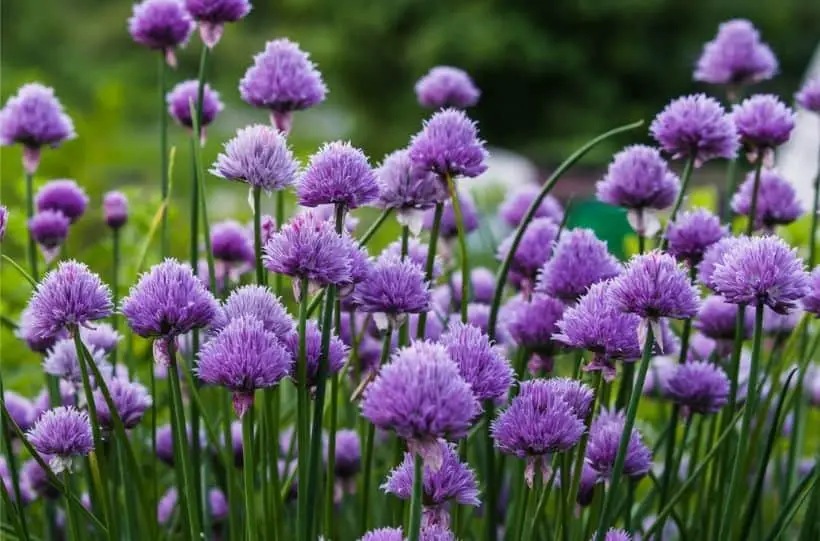
Chives are one of the best companion plants out of alliums as not only do they deter pests with their aroma, but they also attract beneficial pollinators once in bloom.
Beans and Peas
Beans are often used as companion plants with many crops and for good reason. They help add nitrogen back into the soil which benefits brussel sprouts.
Peas also work well planted with brussel sprouts as they do not compete for space or resources. They help to loosen the soil improving drainage.
However, both plants are loved by aphids so if planted together, make sure to create a strong barrier of other companion plants that deter aphids such as planting alliums.
Chamomile
Another flavour-enhancing crop is chamomile. Planting chamomile near your brussel sprouts can help improve the taste. However, be careful not to plant chamomile too close to your brussel sprout crop as they can also hinder the growth of your crops.
Herbs
Aromatic herbs can have an amazing effect when grown next to brussel sprouts. Due to their strong aroma, they can help repel several pests.
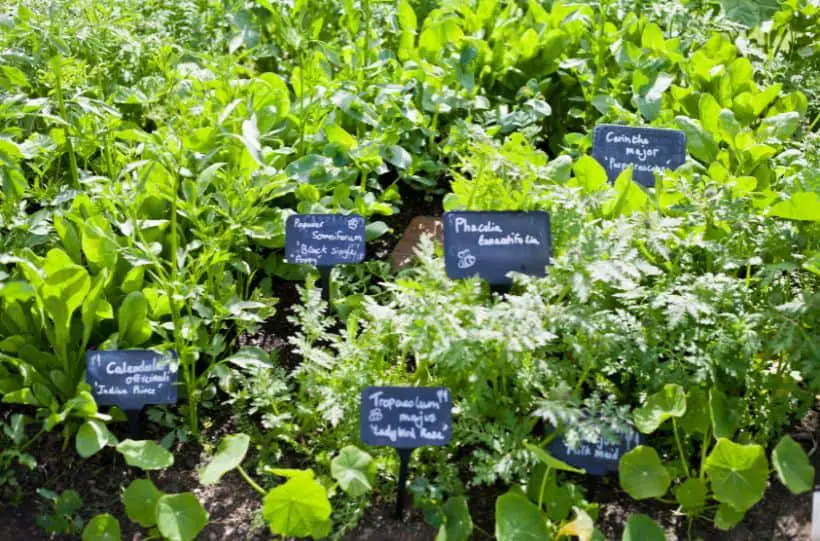
- Dill: dill can help improve the flavour of your brussel sprouts, and attract bees and beneficial insects such as ladybirds to help remove pests such as aphids and beetles.
- Mint: a very strong scent that helps deter flea beetles that love to feed on brussel sprouts and other leafy vegetables.
- Basil: helps deter thrips, flies, mites, and aphids from feeding on your leaves.
- Sage: deters moths and rust flies.
- Rosemary: repels cabbage worms.
Marigolds and Nasturtiums
These two flowers make an excellent defence barrier for most crops making them popular companion plants amongst gardeners.
Marigolds
Marigolds help protect brussel sprout roots from nematodes, which feed on the roots causing the plants to die. Their flowers are strongly aromatic and repel pests such as aphids, spider mites, and flea beetles.
Due to being so brightly coloured, they are highly appealing to pollinators.
Nasturtiums
Another brightly coloured flower that attracts several pollinators such as bees and butterflies with their wide-open petals and easily accessible pollen.
As they grow low to the ground, they also protect the soil from direct sunlight preventing moisture loss and also prevent weeds from growing.
Similar to marigolds, they are easy to grow and are strongly scented helping to repel pests such as flea beetles and cabbage worms. They are very appealing to aphids, which makes them a good trap crop to deter aphids away from your vegetables.
What To Avoid Planting With Brussel Sprouts
Just as there are plants that make excellent companion plants, there are also crops you should avoid planting together. It could be that they attract the same pests, compete for space, or are hungry feeders using lots of nutrients which will prevent other crops from growing.
Brassicas
Plants such as cabbage, cauliflower and broccoli each have similar needs to brussel sprouts. This means they will compete for space and nutrients meaning that your crops will not reach their full potential.
Not only that but they are loved by the same pests. This means that if planted together, it creates a feeding ground for insects such as aphids and cabbage worms which will destroy your whole crop.
If you want to plant more than one type of brassica, ensure to plant them in different areas of your garden and with pest-deterring crops such as marigolds around them.
Nightshades
Plants such as tomatoes, potatoes, peppers, and eggplants should be planted far away from brussel sprouts.
Nightshades are extremely heavy feeders that will directly compete for nutrients with your brussel sprouts.
Potatoes especially should be avoided as they attract several pests that also love to feed on brussel sprouts.
Strawberries
Strawberries and brussel sprouts are a definite no-no combination. Strawberries can inhibit the growth of your brussel sprouts, and any type of brassica. They can also attract a variety of pests that would also feed on your brussel sprout plants.
Brussel sprouts are also heavy feeders which will use the nutrients within the soil inhibiting your strawberry’s growth.
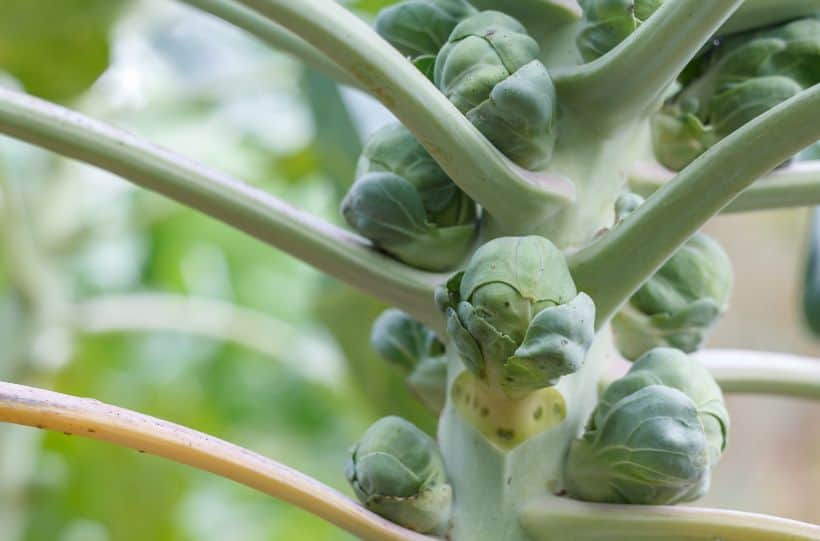
So, if you are wanting to grow brussel sprouts in your garden, make sure to select a range of plants from this companion planting list. Plants such as marigolds, aromatic herbs, and carrots will support your brussel sprout crops to thrive.
Whereas you must avoid planting nightshades, other brassicas, and strawberries as these will inhibit your brussel sprouts and attract pests to your crops.
For more companion planting tips, make sure to take a look at these posts below:

